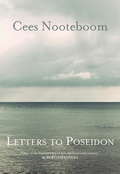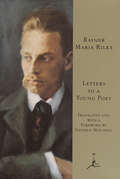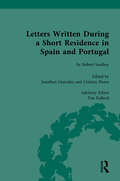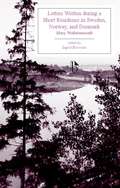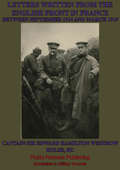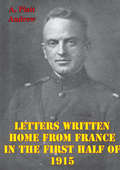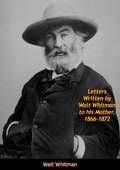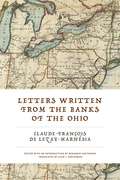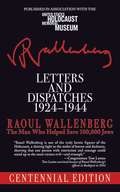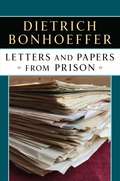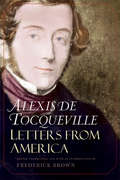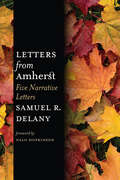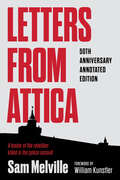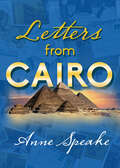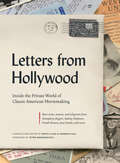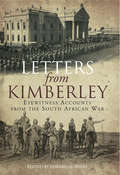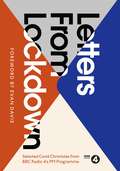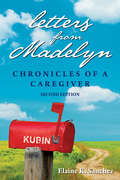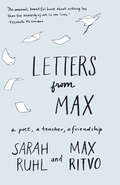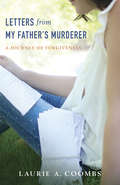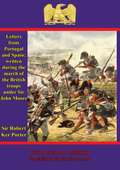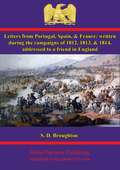- Table View
- List View
Letters To Poseidon
by Cees Nooteboom'I had been looking for someone to write to for a long time, but how does a man write letters to a god?' From his Mediterranean garden on the island of Menorca, Cees Nooteboom writes to the trident-wielding deity, Poseidon, 'initiating a dialogue not only with the past,' as Alberto Manguel observes in his Preface, 'but with an entire world that seemed lost for ever.' Offering a seductive interweaving of keen observation and the fruits of a vast knowledge, Nooteboom explores questions of human existence through the minutiae of the living world around him, and marvels at the secrets of the deep. He recalls figures in history, places he has travelled to, objets trouvés, works of art and literature, and takes a fresh look at the ancient myths. At once playful and poignant, beautiful and bizarre, Nooteboom's Letters to Poseidon are couched in the glittering prose of one of Europe's outstanding stylists.
Letters To Poseidon
by Cees Nooteboom'I had been looking for someone to write to for a long time, but how does a man write letters to a god?' From his Mediterranean garden on the island of Menorca, Cees Nooteboom writes to the trident-wielding deity, Poseidon, 'initiating a dialogue not only with the past,' as Alberto Manguel observes in his Preface, 'but with an entire world that seemed lost for ever.' Offering a seductive interweaving of keen observation and the fruits of a vast knowledge, Nooteboom explores questions of human existence through the minutiae of the living world around him, and marvels at the secrets of the deep. He recalls figures in history, places he has travelled to, objets trouvés, works of art and literature, and takes a fresh look at the ancient myths. At once playful and poignant, beautiful and bizarre, Nooteboom's Letters to Poseidon are couched in the glittering prose of one of Europe's outstanding stylists.
Letters To a Young Poet
by Rainer Maria RilkeRilke&’s Letters to a Young Poet are arguably the most famous and beloved letters of the twentieth century. Written when the poet was himself still a young man, with most of his greatest work before him, they were addressed to a student who had sent Rilke some of his own writing, asking for advice on becoming a writer. The two never met, but over a period of several years Rilke wrote him these ten letters, which have been cherished by hundreds of thousands of readers for what Stephen Mitchell calls in his Foreword the "vibrant and deeply felt experience of life" that informs them. Eloquent and personal, Rilke&’s meditations on the creative process, the nature of love, the wisdom of children, and the importance of solitude offer a wealth of spiritual and practical guidance for anyone. At the same time, this collection, in Stephen Mitchell&’s definitive translation, reveals the thoughts and feelings of one of the greatest poets and most distinctive sensibilities of the twentieth century.
Letters Written During a Short Residence in Spain and Portugal: by Robert Southey
by Jonathan Gonzalez and Cristina FloresIn 1797 Robert Southey published a richly detailed account of his journey in Spain and Portugal between December 1795 and May 1796, from his arrival in Coruna in the northwest of the Spanish coast to the heart of Castile and into Madrid, before making his way to Lisbon. Structured as a series of letters written as he travelled across the Iberian Peninsula, Letters Written During a Short Residence in Spain and Portugal engages with the tradition of English travelogues, while borrowing traits from other genres such as the journal, translation, literary criticism, history, and the picturesque guidebook. On his way, Southey comments on every aspect of Spanish and Portuguese society, from local food and wine, bizarre customs, literature and theatregoing, to Iberian politics and religion. In his letters Southey, who would grow to become one of the leading Hispanists in late Georgian England, contrasts the political, religious, cultural and social systems of Britain and two of the oldest nations in the European continent in a way that raises important questions about cultural contact and transmission during the Romantic period. This edition critically reassesses Letters Written During a Short Residence in Spain and Portugal by looking at Southey’s deeply ambiguous cultural cosmopolitanism and his life-long investment in all things Spanish and Portuguese.
Letters Written During a Short Residence in Sweden, Norway, and Denmark
by Mary Wollstonecraft"The art of travelling is only a branch of the art of thinking," Mary Wollstonecraft wrote in one of her many reviews of works of travel writing. A Short Residenceis her own travel memoir. In a series of letters addressed to an unnamed lover, the work narrates Wollstonecraft's journey through Scandinavia in 1795, on much of which she was accompanied by her infant daughter. Passionate and personal, A Short Residenceis at once a moving epistolary travel narrative, a politically-motivated ethnographic tract, a work of scenic tourism, and a sentimental journey. It is both as much a work of political thought as Wollstonecraft's better known treatises, and a brilliant, innovative, and influential work in the genre. This Broadview edition provides a helpful introduction and extensive appendices that contextualize this remarkable text in relation to key political and aesthetic debates. It also includes a significant selection from Wollstonecraft's travel reviews.
Letters Written From The English Front In France Between September 1914 And March 1915
by Captain Sir Edward Hamilton Westrow HulseCaptain Sir Edward Hamilton Westrow Hulse, now lying in Rue-David Military Cemetery, Fleurbaix, a fallen officer of the Scots Guards who died bravely trying to go to the rescue of his commanding officer during the battle of Neuve Chapelle in 1915. Perhaps no further trace of him would now exist, bar family and friends, were it not for these most interesting letters that were collected and only printed for a select distribution; however, they attained a far greater readership due to their interesting and elegant style.The writer of these letters had a sense both of perspective and of humour,--without which all records are but as the dry bones of the events they chronicle. For example, the rapid and careless pen-sketches that describe the work of a night raid, the reception of a prisoner, the excitement of a sniping party, the confusion at Havre, and a dozen other incidents of that crowded half-year are every one of them admirable. But there is something else in these letters which is of even greater interest. Without hesitation it may be said that in the fourteen pages under the date December 28th we have the most keenly noted, vigorous and dramatic description that ever has or ever will be written of what from a psychological point of view has been the most extraordinary event of the war,--the Christmas Truce of 1914. In its mere literary aspect it is as perfect as anything written from the front: and as a human document it is of even greater value.
Letters Written Home From France In The First Half Of 1915
by A. Piatt AndrewThis volume of the collected letters of A Piatt Andrew form a fascinating insight into the formation of the justly famous American Field Service which did so much help the Allied wounded during the First World War."Col. Andrew was one of the first Americans to take an active part in the World War. Going to France in December 1914, he secured from the French Army authorization for American volunteer ambulance units to serve with the French divisions at the front, and with American volunteers as drivers, and with cars purchased from American donations, he built up an organization known as the American Field Service, which, before any American troops had arrived in France, had thirty-four ambulance sections and twelve camion sections serving with the French troops in France and in the Balkans. This organization took part in every great battle in which French troops were engaged in 1915, 1916 and 1917, and with its personnel of more than 2,400 young Americans, formed the most considerable organized representation which the United States had on the battle front during the first three years of the war."After the entry of the United States in the war, Col. Andrew turned over to the American Army the efficient organization which he had developed, and was commissioned Major, and subsequently Lieutenant-Colonel in that Army. His period of service with the French and American armies covered more than four and a half years. He was decorated by the French Army with the Croix de Guerre, and the Legion of Honor, and by the United States with the Distinguished Service Medal." - National Cyclopedia of American Biography
Letters Written from the Banks of the Ohio
by Claude-François de Lezay-MarnésiaFirst published in French in 1792, Letters Written from the Banks of the Ohio tells the fascinating story of French aristocrat Claude-François de Lezay-Marnésia and the utopia he attempted to create in what is now Ohio. Looking to build a perfect society based on what France might have become without the Revolution, Lezay-Marnésia bought more than twenty thousand acres of land along the banks of the Ohio River from the Scioto Company, which promised French aristocrats a fertile, conflict-free refuge. But hostilities between the U.S. Army and the Native American tribes who still lived on the land prevented the marquis from taking possession. Ruined and on the verge of madness, Lezay-Marnésia returned to France just as the Revolution was taking a more radical turn. He barely escaped the guillotine before dying a few years later in poverty and desperation.This edition of the Letters, introduced and edited by Benjamin Hoffmann and superbly translated by Alan J. Singerman, presents the work for the first time since the beginning of the nineteenth century—and the first time ever in English. The volume features a rich collection of supplementary documents, including texts by Lezay-Marnésia’s son, Albert de Lezay-Marnésia, and the American novelist Hugh Henry Brackenridge. This fresh perspective on the young United States as it was represented in French literature casts new light on a captivating and tumultuous period in the history of two nations.
Letters Written from the Banks of the Ohio (G - Reference, Information and Interdisciplinary Subjects)
by Claude-François de Lezay-Marnésia Benjamin Hoffmann Alan J. SingermanFirst published in French in 1792, Letters Written from the Banks of the Ohio tells the fascinating story of French aristocrat Claude-François de Lezay-Marnésia and the utopia he attempted to create in what is now Ohio. Looking to build a perfect society based on what France might have become without the Revolution, Lezay-Marnésia bought more than twenty thousand acres of land along the banks of the Ohio River from the Scioto Company, which promised French aristocrats a fertile, conflict-free refuge. But hostilities between the U.S. Army and the Native American tribes who still lived on the land prevented the marquis from taking possession. Ruined and on the verge of madness, Lezay-Marnésia returned to France just as the Revolution was taking a more radical turn. He barely escaped the guillotine before dying a few years later in poverty and desperation.This edition of the Letters, introduced and edited by Benjamin Hoffmann and superbly translated by Alan J. Singerman, presents the work for the first time since the beginning of the nineteenth century—and the first time ever in English. The volume features a rich collection of supplementary documents, including texts by Lezay-Marnésia’s son, Albert de Lezay-Marnésia, and the American novelist Hugh Henry Brackenridge. This fresh perspective on the young United States as it was represented in French literature casts new light on a captivating and tumultuous period in the history of two nations.
Letters and Dispatches 1924-1944: The Man Who Saved Over 100,000 Jews, Centennial Edition
by Raoul WallenbergThe best way to hear the story of Raoul Wallenberg is through his own words. Put together from three different collections, Letters and Dispatches is the most thorough book of Wallenberg's writings and letters. With his disappearance behind the Iron Curtain in January of 1945, he became tragically mysterious. While the story of Wallenberg has been told many times over, the best way we can possibly understand and relate to him is through his written word, which Letters and Dispatches has in full.
Letters and Papers from Prison: Dietrich Bonhoeffer Works (Dietrich Bonhoeffer Works)
by Dietrich BonhoefferOne of the great classics of prison literature, Letters and Papers from Prison effectively serves as the last will and testament of the Lutheran theologian Dietrich Bonhoeffer. Dietrich Bonhoeffer was a young German pastor who was executed by the Nazis in 1945 for his part in the “officers’ plot” to assassinate Adolf Hitler. This expanded version of Letters and Papers from Prison shifts the emphasis of earlier editions of Bonhoeffer’s theological reflections to the private sphere of his life. His letters appear in greater detail and show his daily concerns. Letters from Bonhoeffer’s parents, siblings, and other relatives have also been added, in addition to previously inaccessible letters and legal papers referring to his trial. Acute and subtle, warm and perceptive, yet also profoundly moving, the documents collectively tell a very human story of loss, of courage, and of hope. Bonhoeffer’s story seems as vitally relevant, as politically prophetic, and as theologically significant today, as it did yesterday.
Letters from America: Alexis de Tocqueville
by Alexis De Tocqueville Frederick BrownYoung Alexis de Tocqueville arrived in the United States for the first time in May 1831, commissioned by the French government to study the American prison system. For the next nine months he and his companion, Gustave de Beaumont, traveled and observed not only prisons but also the political, economic, and social systems of the early republic. Along the way, they frequently reported back to friends and family members in France. This book presents the first translation of the complete letters Tocqueville wrote during that seminal journey, accompanied by excerpts from Beaumont’s correspondence that provide details or different perspectives on the places, people, and American life and attitudes the travelers encountered. These delightful letters provide an intimate portrait of the complicated, talented Tocqueville, who opened himself without prejudice to the world of Jacksonian America. Moreover, they contain many of the impressions and ideas that served as preliminary sketches for Democracy in America, his classic account of the American democratic system that remains an important reference work to this day. Accessible, witty, and charming, the letters Tocqueville penned while in America are of major interest to general readers, scholars, and students alike.
Letters from Amherst: Five Narrative Letters
by Samuel R. DelanyEntertaining and informative letters written from 1984 to 1991 by the award-winning author and critic. Five substantial letters written from 1989 to 1991 bring readers into conversation with Hugo and Nebula Award–winning author Samuel Delany. With engaging prose, Delany shares details about his work, his relationships, and the thoughts he had while living in Amherst and teaching as a professor at the UMASS campus just outside of town, in contrast to the more chaotic life of New York City. Along with commentary on his own work and the work of other writers, he ponders the state of America, discusses friends who are facing AIDS and other ailments, and comments on the politics of working in academia. Two of the letters, which tell the story of his meeting his life partner Dennis, became the basis of his 1995 graphic novel, Bread & Wine. Another letter describes the funeral of his uncle Hubert T. Delany, former judge and well-known civil rights activist, and leads to reflections on his family&’s life in 1950s Harlem. Another details a visit from science fiction writer and critic Judith Merril, and in another he gives a portrait of his one-time student Octavia E. Butler, who by then has become his colleague. In addition, an appendix shares ten letters Delany sent to his daughter while she attended summer camp between 1984 and 1988. These letters describe Delany&’s daily life, including visitors to his upper-west-side apartment, his travels for work and pleasure, lectures attended, movies viewed, and exhibits seen.&“Letters from Amherst is significant and important. Delany provides unseen glimpses into his important familial lineages, personal friendship and partnership, his assessment of universities and their politics, and just a general joy in anything that has to do with intellectual culture.&” —L.H. Stallings, author of Funk the Erotic: Transaesthetics and Black Sexual Cultures&“Letters from Amherst gives readers insight into the personal and professional life and aesthetic assessments of the author, Samuel R. Delany, one of the most important literary figures of our time.&” —Nisi Shawl, author of the Nebula Award Finalist novel Everfair, and the James Tiptree Jr. Award–winning story collection Filter House
Letters from Attica: 50th Anniversary Annotated Edition
by Joshua Melville Sam MelvilleNow presented with a son's thirty years of research to provide new context. In June 1970, Sam Melville pleaded guilty to a series of politically motivated bombings in New York City and was sentenced to thirteen to eighteen years in jail. His imprisonment took him to Attica, where he helped lead the massive rebellion of September 9, 1971—and where, four days later, he was shot to death by state police. During nearly two years in prison, Melville wrote letters to his friends, his attorneys, his former wife, and his young son. To read them is to eavesdrop on a man's soul. Determinedly honest and deeply moving, they reveal much about Sam and evoke the suffering of prisoners in America. Collected after his death, the letters were originally published with material by Jane Alpert, who was living with Sam when both were arrested on bombing charges, and John Cohen, a close friend who visited Sam in jail. Sam's letters begin with despair but end in hope and defiance. He became a leader of the prisoners' struggle for justice and humane treatment. At Attica he fought against and was a victim of the state's brutality. Those who knew Sam found him a man of extraordinary courage and determination, who rather than accede or submit to injustice and racism chose to fight against them.
Letters from Cairo
by Anne SpeakeA woman recounts her adventures in Egypt, the Middle East, and beyond in this absorbing memoir. Imbued with a love of travel and adventure as a child through books her parents bought her during the Great Depression, Anne Speake would eventually go on to journey to many destinations in her adult life, from Paris to Thailand to Greece—but she particularly fell in love with the Middle East, especially the city of Cairo—to which she&’s returned at least thirty times over the decades. This memoir of her times in Egypt, from sailing the Nile to visiting with the Sadats to living for a while in her beloved Cairo—as well as trips to Saudi Arabia, Morocco, Turkey, Syria, Palestine and Israel and more—is an in-depth, wide-ranging account of a well-traveled life that also provides a close-up view of late-twentieth-century history in the region, as well as the ways the Middle East has changed, and the ways it hasn&’t, over time.
Letters from Hollywood: Inside the Private World of Classic American Moviemaking
by Rocky Lang; Barbara HallRare correspondence from Humphrey Bogart, Audrey Hepburn, Frank Sinatra, Jane Fonda, and other Hollywood luminaries from the silent film era to the 1970s. Letters from Hollywood reproduces in full color scores of entertaining and insightful pieces of correspondence from some of the most notable and talented film industry names of all time—from the silent era to the golden age, and up through the pre-email days of the 1970s. Culled from libraries, archives, and personal collections, the 135 letters, memos, and telegrams are organized chronologically and are annotated by the authors to provide backstories and further context. While each piece reveals a specific moment in time, taken together, the letters convey a bigger picture of Hollywood history. Contributors include celebrities like Greta Garbo, Alfred Hitchcock, Humphrey Bogart, Frank Sinatra, Katharine Hepburn, Marlon Brando, Elia Kazan, Cary Grant, Francis Ford Coppola, Tom Hanks, and Jane Fonda. This is the gift book of the season for fans of classic Hollywood.With a foreword by Peter Bogdanovitch.“This is, quite simply, one of the finest books I’ve ever read about Hollywood.” —Leonard Maltin
Letters from Kimberly: Etewitness Accounts from the South African War
by Edward Spiers'Full of new material, fresh insights and perceptive analysis.' Ian KnightThe defence of Kimberley and the mission to relieve it was one of the great dramatic sagas of the South African War. The actual relief, following a spectacular cavalry charge, represented the first decisive upturn in the fortunes of the British war effort, soon followed by a crushing defeat of the Boers at the battle of Paardeberg. Within Kimberley citizens suffered from dwindling food stocks and enemy shelling, but even more controversial were the tensions that erupted between the siege commander, Lieutenant-Colonel Kekewich, and Kimberley's leading citizen, Cecil Rhodes. In this illuminating new history, Edward Spiers, presents a selection of first-hand accounts of this epic siege. The 260 letters were published originally in British metropolitan and provincial newspapers and they provide crucial insights into the perceptions of civilians caught up in the siege; the desperate and bloody attempts to relieve the town; and the experiences of junior officers and other ranks as they struggled to cope with the demands of modern warfare. Full of human incident, drama and pathos, these fascinating eyewitness testimonies make for compelling reading and add richly to our understanding of the events in Cape Colony.
Letters from Lockdown: A Selection of Covid Chronicles from BBC Radio 4’s PM Programme
by Evan DavisA remarkable collection of 'Covid Chronicles' -- stories from lockdown sent in from listeners to BBC Radio 4 -- making a deeply moving people's history of the pandemic. On 23 March 2020, as the deadly virus spread around the world, the UK went into lockdown. In the following weeks and months, it became clear that in many ways we were all in this together, but the illness and the long period of isolation would hit people in entirely different ways.When BBC Radio 4's PM Programme launched the 'Covid Chronicles' series, listeners from across the country - and beyond - began sending in their lockdown stories to be aired on the show. The results are astonishing: moving, profound, funny, powerful and an invaluable record of our collective experiences. Ranging from the everyday (the thrill of booking a food delivery) to the momentous (a wedding on Zoom), we hear about birth and death, loneliness and loss, community and kindness, as well as remarkable stories from those working in the NHS on the front line.This book is a collection of some of these Chronicles, written in the midst of one of the most unexpected and intense moments in our history. Together they give us an unforgettable portrait of ordinary people caught in extraordinary times, with all the humour and tragedy and uncertainty we've been through. 'It's inspiring that so many people have shared their stories - some everyday, some life-changing, but all very human. This is a wonderful collection of experiences, to record and remember this devastating year' Christie Watson, bestselling author of The Language of Kindness
Letters from Madelyn: Chronicles of a Caregiver
by Elaine SanchezMadelyn Kubin is a 70-year-old Kansas farm wife. She appears to be fragile because of her thinning white hair, macular degeneration, osteoporosis, congestive heart failure, and severe hearing loss. But when her husband Quentin suffers a debilitating stroke, she is forced to summon all of her physical, emotional, and spiritual strengths in order to care for him at home.Madelyn manages her isolation, loneliness, and stress by going to her computer, disengaging her emotional monitor, and writing letters to her daughter Elaine.Madelyn's story of faith, courage, and love is told through her unflinching honest and surprisingly funny letters written in real time over the course of six-and-a-half years. Although she prays ever day that she will be a willing channel for God's love and compassion, there are plenty of days she feels like telling God to go find himself another servant. Madelyn writes unabashedly about her anger, guilt, depression, and grief. When Quentin displays dementia-related inappropriate sexual behavior, Madelyn eventually learns how to handle it with grace and humor. She shows how it is possible, even in the very worst end-of-life situations, to experience mental and spiritual growth.
Letters from Max: A Poet, a Teacher, a Friendship
by Sarah Ruhl Max RitvoA real professor and her student forge a friendship through correspondence as they discuss love, art, life, cancer, and death. In 2012, Sarah Ruhl was a distinguished author and playwright, twice a finalist for the Pulitzer Prize. Max Ritvo, a student in her playwriting class at Yale University, was an exuberant, opinionated, and highly gifted poet. He was also in remission from pediatric cancer. Over the next four years—in which Ritvo&’s illness returned and his health declined, even as his productivity bloomed—the two exchanged letters that spark with urgency, humor, and the desire for connection. Reincarnation, books, the afterlife as an Amtrak quiet car, good soup: in Ruhl and Ritvo&’s exchanges, all ideas are fair, nourishing game, shared and debated in a spirit of generosity and love. &“We&’ll always know one another forever, however long ever is,&” Ritvo writes. &“And that&’s all I want—is to know you forever.&” Studded with poems and songs, Letters from Max is a deeply moving portrait of a friendship, and a shimmering exploration of love, art, mortality, and the afterlife.Praise for Letters from Max &“An unusual, beautiful book about nothing less than the necessity of art in our lives. Two big-hearted, big-brained writers have allowed us to eavesdrop on their friendship: jokes and heartbreaks, admiration, hard work, tender work.&” —Elizabeth McCracken, author of Bowlaway &“Immediate comparisons will be made to Rainer Maria Rilke&’s Letters to a Young Artist . . . this book is a nuanced look at the evolution of an incredible talent facing mortality and the mentor, never condescending, who recognizes his gift. Their infectious letters shine with a love of words and beauty.&” —The Observer &“Deeply moving, often heartbreaking. . . . A captivating celebration of life and love.&” —Kirkus Reviews &“Moving and erudite . . . devastating and lyrical . . . Ruhl draws a comparison between their correspondence and that between poets Robert Lowell and Elizabeth Bishop, and indeed, with the depth and intelligence displayed, one feels in the presence of literary titans.&” —Publishers Weekly
Letters from My Father's Murderer: A Journey of Forgiveness
by Laurie A. CoombsAn extraordinary true story of grace, mercy, and the redemptive power of God.When her father was murdered, Laurie Coombs and her family sought justice--and found it. Yet, despite the swift punishment of the killer, Laurie found herself increasingly full of pain, bitterness, and anger she couldn't control. It was the call to love and forgive her father's murderer that set her, the murderer, and several other inmates on the journey that would truly change their lives forever.This compelling story of transformation will touch the deepest wounds and show how God can redeem what seems unredeemable.
Letters from My Sister: On Life, Love and Hair Removal
by Eve Lederman Faye LedermanEve and Faye's correspondence began with a simple letter about a bad job interview or bad hair day, seeking comfort from hundreds of miles away. As their adult lives unfolded, gender roles, career choices, and family relationships became fair game, subject to both scrutiny and hilarity as the Ledermans lovingly ridicule everyone in their path.In one letter, Faye laments, "Every time I apply mascara before an interview my eyelashes get all clumped together. I'm afraid if the interviewer catches my profile he'll think I'm applying for the position of prostitute." In another, Eve ponders their father's ineptness. "If Mom left for the weekend, she'd return home to find Dad emaciated on the floor, tin cans strewn around with bite marks."Ultimately, the sisters reassure each other that they are not alone in their search for the ultimate man ("a big, buff, macho, kind, sensitive, feminist"), the ideal job, or the perfect hair removal method. The Ledermans emerge as feisty, independent women who confront their femininity but aren't confined by it. Instead, they are able to laugh long and hard at themselves, enticing and empowering readers to do the same.
Letters from Portugal and Spain: Written During The March Of The British Troops Under Sir John Moore
by Sir Rober Ker PorterSir Robert Ker Porter's life was as varied and dramatic as his paintings. A noted author, artist, soldier and diplomat, he was born into a military family in Durham. After developing a reputation for his painting, he travelled extensively in Northern Europe, before accepting commissions for historical paintings from the Tzar of Russia in 1805. He travelled on to Sweden where he met Sir John Moore. Sir John found him congenial company and invited him to accompany the expedition to Spain that he was to lead. Sir John's campaign in 1808 was to be brief, outnumbered by his French opponents by massive odds, and with the weight of British and Spanish hopes encumbering him, he opted for a bold thrust at an isolated French corps under Soult. The British troops were discovered on their approach march and, despite a number of successful small engagements, the imminent danger of the other French corps rushing to surround the small body of British men was obvious to Moore. His only choice was to retreat through some of the roughest country in Europe: through the crags, ravines and gorges on Northern Spain. Fending off successive French attacks, dealing with drunken starving soldiers, and rapidly diminishing supplies, Sir John drove his men on to Coruña, where he fought a sterling defensive battle to ensure that his men could be carried off by the Royal Navy.Sir Robert Porter's work illustrates the hardships and difficulties men and officers of the British force with all of the eye for detail that an artist can summon. His letters are one of the prime sources for the campaign of 1808.Author -- Porter, Robert Ker, Sir, 1777-1842.Text taken, whole and complete, from the edition published in London: Longman, Hurst, Rees, and Orme, 1809 Original Page Count - xiv, 320 p.Illustrations -- 7 engravings.
Letters from Portugal, Spain, & France: Written During The Campaigns Of 1812, 1813, And 1814
by S. D. BroughtonAfter studying at St. George's Hospital, the author was appointed assistant surgeon of the 2nd Life Guards and placed in charge of the service squadron's that were to be posted to the Peninsular in 1812. His life in the army was to be much different from the sinecure of London life and his account book presents a very personal view of his campaigning experiences on the march from Lisbon to Boulogne during the Peninsular War against Napoleonic France. The letters contain fascinating details not often found in memoirs concerning this campaign, including descriptions of the local diet and portrayals of contemporary society, festivals, and customs, as well as recording the particulars of the military actions in which the author was engaged. From the balls and dinner-parties in Lisbon via the discomforts of campaign to the splendours of Paris, this is an engaging and elegant narrative of a tumultuous period in European history.Author --S. D. Broughton (1787-1837)Text taken, whole and complete, from the edition published in London: Longman, Hurst, Rees, Orme, and Brown, 1815.Original Page Count - vi and 412 pages.
